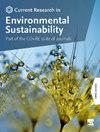A fuzzy based sustainability assessment tool for small island states
Abstract
The global change between human activities and the natural environment has evolved with technological growth and economic development. Due to their size and small population, small island states have become the most vulnerable to these irreversible changes. These have raised the importance for taking some initiatives for human benefits, economic welfare and environmental protection. Sustainable practices and performance measurement are important for these small island states. The purpose of this paper was to develop a quantitative modelling tool to measure sustainability performance for small island states while considering the three sustainability spheres namely environment, economic and social in an integrated manner. A Sustainability Assessment Tool for Small Island States (SATIS) was developed based on a fuzzy methodological approach which used sustainability indicators for the three dimensions. The research began by identifying the indicators for Mauritius island which were then selected according to their level of importance for this research study through an expert survey. Data was then collected and applied to the proposed model. A Sensitivity analysis was conducted in order to stress on the most influencing factors that were affecting the overall system. The model was then validated using recent data. It was observed that fuzzy logic approach has shown great reasoning capabilities which traditional mathematical tools failed to produce. The fuzzy based methodological approach was found to be a remarkable tool for monitoring sustainability performance in small island states. To conclude, this model is recommended for sustainability assessment. Practitioners can apply this modelling technique to track sustainability performance of Small Island Developing States (SIDS).

 求助内容:
求助内容: 应助结果提醒方式:
应助结果提醒方式:


